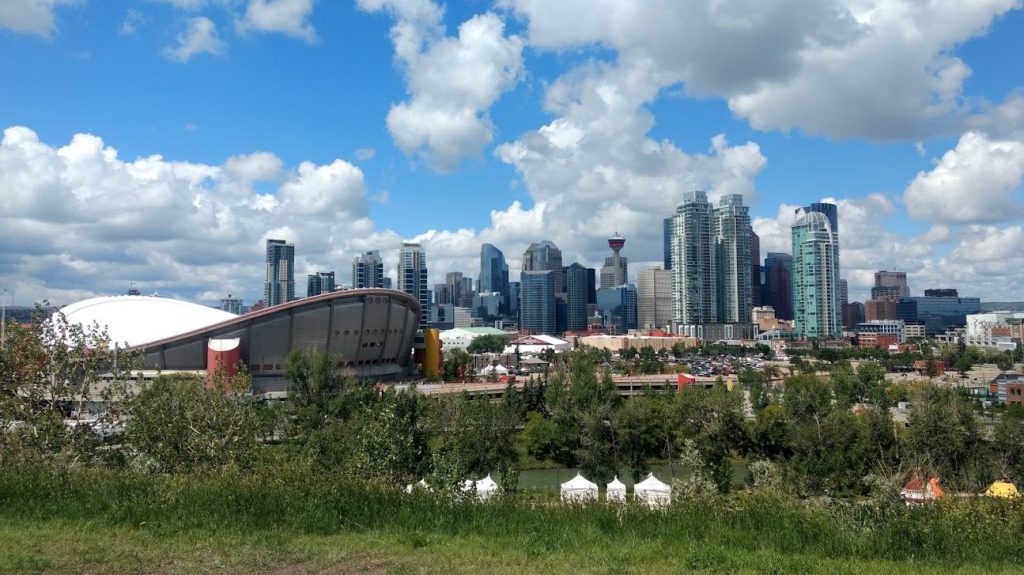‘They would call me Osama’s cousin’: Muslim sisters share experiences of racism in Canada
Posted Feb 1, 2021 5:00 am.
Last Updated Feb 2, 2021 9:28 am.
EDMONTON (NEWS 1130) – Shams and Qamar Ahmad are two Muslim sisters who survived war and sought refuge with their family in Canada, but they did not escape racism in Edmonton or Montreal because of their religious appearance.
While Shams was heading to her school in St. Albert in 2019, she was confronted at a bus stop by a man who was getting aggressive. She is speaking publicly about the state of daze that struck her after the man slapped her in the face.
“He was just straight up saying derogatory words, swearing at me, saying that I shouldn’t be here, that I’m stealing jobs and stealing his kids’ class time — just the random-est things — accusing me of just robbing him of his life, basically. He included a lot of racism,” she said.
Related article: ‘Am I racist?’ campaign prompts British Columbians to examine internalized racism
Shams and her family survived the Iraqi war and came to Canada as refugees in 2010. She was hurt by this attack, in the country where she had sought safety.
“I looked down and I was like, ‘You know, I have just as much of a right to be here as you do. We’re all here together to just build a good life,'” she said.
“Next thing I know, I just I feel a slap across the face. And at the moment I couldn’t really process what was going on. I was just very shocked by the whole situation and I remember sitting there — it could have been 10 minutes, could have been an hour, I don’t remember any of it — after that, I just kind of went blank. I couldn’t hear anything anymore and everything went quiet.”
Although Shams filed a complaint to the police in St. Albert, she says they did not take her seriously.
“A lot of people have that saying that say at least we’re not like the U.S., but it’s no, we are. Maybe not as intense or as open … but it’s there, the racism is there. The hate incidents are there,” she said.
Related article: VPD forms team as response to high rate of hate crimes during COVID-19 pandemic
Activists in the Muslim community in Alberta are calling for immediate actions to protect the rights of the visible minorities.
Trent Daley, vice president of Integration and Program Development with the Alberta Muslim Public Affairs Council, says his “heart bleeds” for his community.
“We need systemic change and for that to happen, we need to address the root causes of intolerance, of racism, of islamophobia,” he said. “That comes through not only education but it comes through social action and supporting social support of these vulnerable communities. It comes through normalizing different identities within Canada. And that comes from government.”
“What kind of example is he setting for his daughter?”
According to Statistics Canada, from 2010 to 2018, 45 per cent of victims of violent hate crimes targeting the Muslim population were female, compared with 32 per cent of all hate crime victims.
Shams’ older sister, Qamar, was also subjected to racial comments in Montreal in 2011.
“It was on my birthday and me, my mom and my sister were walking down the street and someone just drove right in front of us,” she said.
“He’s like, if you want to be a Canadian, then you should dress like one. If you want to live here, you should just like us. Right before we could finish telling him that you don’t have the right to tell us that, he just drove off,” she said.
She adds it appears the man’s wife and daughter were in the car with him.
“What kind of example is he setting for the daughter? She’s gonna grow up to think the same thing, just because their parents are telling her this is the right way and this is what you need to believe.”
Related article: One racist act begets another on Vancouver bus as Filipino man told to ‘speak English’
Unfortunately, these aren’t the only times they have heard hurtful comments because of their religious attire. Qamar says she has been called a “terrorist,” “ignorant” and “Osama’s cousin”.
“I put on the Hijab because it’s the symbol of my religion, which is Islam,” she said.
Qamar says her wearing a Hijab has nothing to do with whether she should be considered a civilized member of society.
“I’m a good Canadian citizen,” she said. “I don’t harm anyone. I don’t break the law. It doesn’t make sense to me why something that I wear — just like everyone else that wear whatever they want to wear, they have the freedom to — would make me look uncivilized.”
Daley says community leaders need to be part of the solution to this problem.
“It needs to go beyond performative actions, or sending a tweet, or kneeling with protesters. It needs to be met with swiftness, it needs to be met with sincerity — in the spirit of authenticity. We need our leaders to truly represent meaningful change and part of that comes through legislations,” he said.
“Ask any Hijabi woman … She will have a story.”
Shams says many of her friends are Hijabi women of colour and they all have experienced similar incidents of racism.
“You can ask any Hijabi woman in Edmonton. She will have a story, she will have something to tell you. She’ll have something that changed her life or made her worry more.”
“It definitely has nothing to do with limiting your freedom,” Shams said. “A lot of people see it as a sign of oppression. But if they just come to have a conversation with a person who does wear the Hijab, literally, 99.9% [will say] ‘I picked it and I’m comfortable with it.’
“After 11 years, it’s a part of my identity. I literally identify with it,” she added.










